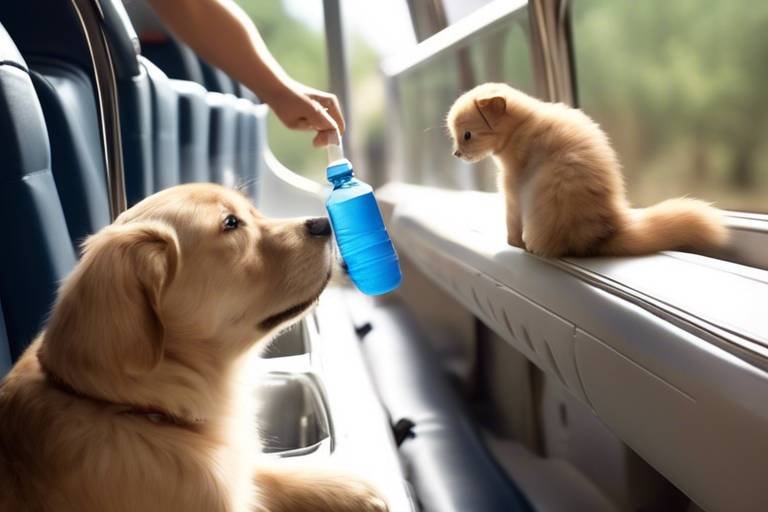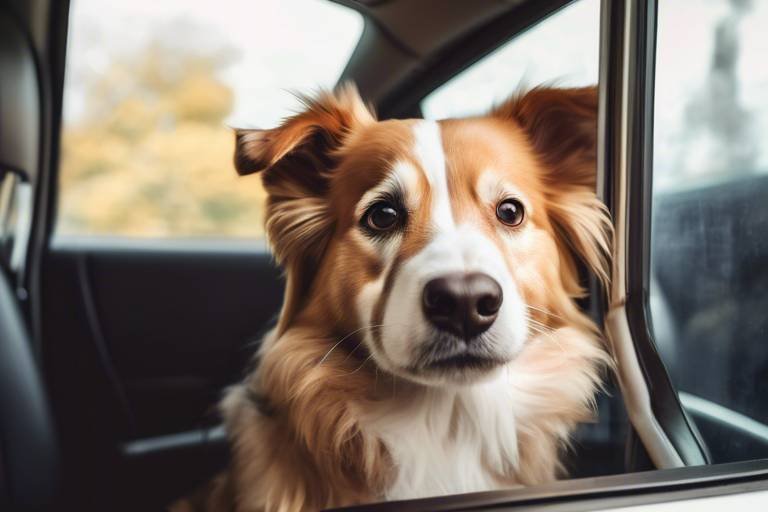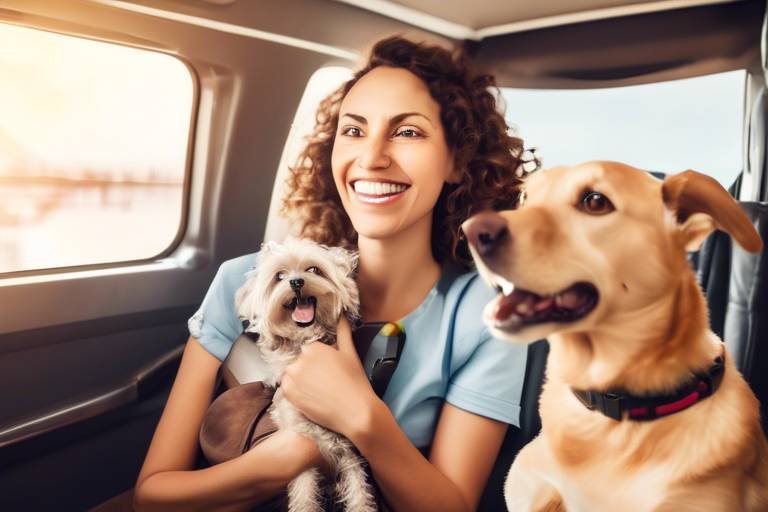The Role of Local Shelters in Pet Travel Awareness
When it comes to traveling with our furry companions, the journey can often feel like a daunting task. However, local shelters play a vital role in promoting awareness about pet travel, ensuring safety, and fostering responsible ownership among pet lovers. Imagine embarking on a road trip with your beloved pet; the excitement can quickly turn to anxiety if you're unsure about the regulations or safety practices involved. This is where shelters step in, acting as a beacon of knowledge and support for pet owners.
Local shelters are not just places for abandoned animals; they are community hubs that provide essential information on pet travel regulations. For instance, did you know that different states have varying laws regarding pet travel? Shelters help educate pet owners about these regulations, ensuring that everyone is aware of the legal requirements necessary for traveling with their pets. This includes understanding vaccination requirements, leash laws, and even breed-specific regulations that can affect your travel plans.
Moreover, shelters play a crucial role in promoting safe travel practices. They educate pet owners on the importance of proper restraint methods, hydration, and acclimatization. Think of it this way: just as you wouldn’t embark on a long journey without preparing yourself, your pet deserves the same consideration. Shelters provide tips on how to keep your pet comfortable during travel, ensuring that both the pet and owner can enjoy the journey without unnecessary stress.
One of the most critical aspects of traveling with pets is choosing the right travel carrier. Local shelters often offer guidance on selecting appropriate carriers, emphasizing factors such as size, comfort, and safety features. A well-chosen carrier can make all the difference in your pet's travel experience. For example, a carrier that is too small can lead to discomfort and anxiety, while one that is too large may not provide the necessary security during transit. Shelters highlight the importance of adhering to carrier safety standards, which can prevent accidents and injuries during travel.
Additionally, preparing your pet for travel is essential. Shelters recommend various training techniques to help pets acclimate to their carriers and travel routines. This preparation can significantly reduce anxiety, making the journey more enjoyable for both pets and their owners. Imagine the peace of mind knowing that your pet is calm and collected, ready to explore new horizons with you!
As pet owners hit the road, being prepared for emergencies is another aspect that shelters emphasize. They equip pet owners with essential tips and resources to handle unexpected situations, from minor health issues to lost pets. It’s like having a safety net—knowing that you have the tools and information to handle any curveball that comes your way while traveling.
In conclusion, local shelters are invaluable resources for pet owners looking to travel safely and responsibly with their animals. They not only provide essential information and resources but also foster a community of responsible pet ownership. By partnering with shelters, pet owners can embark on their journeys with confidence, knowing they have the support they need to ensure a safe and enjoyable experience for their furry friends.
- What should I consider when choosing a travel carrier for my pet? Look for size, comfort, ventilation, and safety features that comply with travel regulations.
- How can I prepare my pet for travel? Gradually acclimate them to their travel carrier and practice short trips to reduce anxiety.
- What are some emergency tips for traveling with pets? Always have a first-aid kit, keep your pet's identification updated, and know the location of nearby veterinary services.
- Are there specific travel regulations I should be aware of? Yes, regulations vary by state and country, so check local laws regarding vaccinations and travel restrictions.

Understanding Pet Travel Regulations
When it comes to traveling with your furry friends, understanding pet travel regulations is absolutely essential. Local shelters play a pivotal role in providing pet owners with the necessary information regarding these regulations. Just like you wouldn’t set off on a road trip without knowing the rules of the road, you shouldn’t embark on a journey with your pet without being aware of the laws that govern pet travel.
Each state, and even different countries, have their own specific regulations that can include vaccination requirements, health certificates, and even quarantine rules. For instance, if you're planning a trip across state lines or internationally, you might need to ensure that your pet is up-to-date on certain vaccinations. Local shelters often provide resources and guidance to help you navigate these requirements, making the process much smoother.
Moreover, understanding these regulations can prevent you from facing hefty fines or, worse yet, being turned away at your destination. Imagine arriving at a pet-friendly hotel only to find out that your pet isn’t allowed in because you didn’t have the proper documentation! Local shelters often collaborate with local authorities to disseminate accurate information, ensuring that pet owners are well-informed.
In addition to vaccination and health documentation, many shelters emphasize the importance of proper identification for your pets. This includes having a collar with tags that contain your contact information and, ideally, a microchip. This way, if your pet gets lost during your travels, they can be easily identified and returned to you. Local shelters often host microchipping events, making it easier for pet owners to get this crucial step taken care of.
To further assist pet owners, many shelters provide checklists for travel preparations. These lists can include:
- Required vaccinations and health checks
- Documentation needed for travel
- Identification methods for your pet
- Emergency contacts and local animal hospitals
By being proactive and utilizing the resources offered by local shelters, pet owners can ensure that they are fully prepared for any travel situation. Whether you're heading to a nearby park or jetting off to a different country, having a solid understanding of pet travel regulations will not only keep your furry friend safe but also make your journey more enjoyable.

Promoting Safe Travel Practices
Traveling with pets can be an exhilarating adventure, but it also comes with its own set of challenges. Local shelters play a pivotal role in promoting safe travel practices for pet owners, ensuring that both pets and their humans have a smooth journey. Imagine embarking on a road trip with your furry friend; the excitement is palpable! However, without proper preparation, that excitement can quickly turn into chaos. This is where shelters step in, providing essential guidelines that transform pet travel from a daunting task into an enjoyable experience.
One of the key aspects of safe travel is understanding how to properly restrain your pet during the journey. Just like we wear seatbelts for safety, our pets need to be secured too. Shelters often advocate for the use of pet seat belts or harnesses that can be attached to the car’s seatbelt system. This not only keeps your pet safe but also minimizes distractions while driving. Imagine the horror of having a pet jump into your lap while you’re navigating a busy highway! By using appropriate restraint methods, you can keep everyone safe and focused on the road ahead.
Moreover, hydration is crucial during travel, especially during long trips. Local shelters emphasize the importance of having fresh water available for your pet at all times. Just like you wouldn’t want to be stuck in a car without a drink on a hot day, your pet deserves the same comfort. Many shelters recommend portable water bottles designed for pets, which make it easy to provide water during rest stops. This simple act can significantly enhance your pet's travel experience, keeping them refreshed and happy.
Another vital component of safe travel practices is acclimatization. Before hitting the road, it’s essential to help your pet adjust to the travel environment. This can include taking short trips around the neighborhood to get them used to being in a moving vehicle. Shelters often suggest gradually increasing the duration of these trips, allowing pets to become familiar with the sensation of travel. Think of it as a warm-up before a big game; it prepares them mentally and physically for the longer journey ahead.
In addition to these practices, local shelters also provide resources for pet owners to educate themselves about travel safety. They often host workshops or distribute pamphlets that cover a range of topics, from choosing the right travel gear to understanding pet behavior in new environments. By staying informed, pet owners can make better decisions that prioritize their pets' comfort and safety.
Ultimately, the goal of promoting safe travel practices is to ensure that every journey is a positive experience for both pets and their owners. By following the guidelines set forth by local shelters, pet owners can embark on their adventures with confidence, knowing they have taken the necessary steps to keep their furry friends safe and happy.
- What should I do if my pet gets anxious while traveling? Consider using calming aids or consulting with a veterinarian for advice on managing travel anxiety.
- Are there specific travel carriers recommended by shelters? Yes, shelters often provide guidelines on choosing carriers that meet safety standards and are comfortable for pets.
- How can I ensure my pet stays hydrated during a long trip? Bring a portable water bottle designed for pets and make regular stops to offer water.
- What are the best practices for traveling with a pet in a car? Use a pet seat belt or carrier, take regular breaks, and never leave your pet unattended in a vehicle.
Choosing the Right Travel Carrier
When it comes to traveling with your furry friend, one of the most critical decisions you’ll make is . Think of it as picking the perfect vehicle for a road trip; it needs to be comfortable, secure, and suitable for the journey ahead. Not all carriers are created equal, and understanding what to look for can make a world of difference for both you and your pet. Local shelters often provide invaluable guidance in this area, helping pet owners navigate the myriad of options available.
First and foremost, size matters! The carrier should be spacious enough for your pet to stand, turn around, and lie down comfortably. A cramped space can lead to anxiety and discomfort, which is the last thing you want on a long trip. Shelters often recommend measuring your pet before purchasing a carrier, as this ensures you choose one that fits your pet's dimensions perfectly. For instance, a small dog may require a different size than a large cat, and having that clarity will save you from potential headaches later.
Additionally, comfort is key. Look for carriers with padded interiors and proper ventilation. A carrier that feels like a cozy den will help your pet feel more at ease during travel. Many shelters suggest opting for carriers with removable, washable covers to keep things clean and hygienic. After all, pets can be a bit messy, right?
Safety features should also be at the forefront of your decision-making process. Ensure the carrier has secure latches and sturdy construction to prevent any accidental escapes. Local shelters often highlight the importance of choosing carriers that meet specific safety standards. For example, carriers that have passed crash tests are ideal for car travel, as they minimize the risk of injury during sudden stops or accidents.
Moreover, consider the type of travel you’ll be doing. If you’re flying, check with the airline for any specific requirements regarding pet carriers. Some airlines have restrictions on dimensions or materials, and local shelters can provide this crucial information to help you stay compliant. On the other hand, if you're planning a road trip, you might want to invest in a carrier that can double as a travel bed once you reach your destination.
In conclusion, choosing the right travel carrier is not just about picking a pretty box; it's about ensuring your pet's comfort, safety, and happiness throughout the journey. Local shelters are a fantastic resource for pet owners, offering guidance and support to make informed decisions. So next time you're gearing up for a trip, remember to give your pet the best ride possible!
- What size carrier do I need for my pet? Measure your pet while they are standing and lying down to ensure the carrier allows enough space for movement.
- Are there specific airline requirements for pet carriers? Yes, each airline has its own guidelines regarding carrier dimensions and materials. Always check in advance!
- Can I use a regular pet carrier for air travel? Not always. Some airlines require carriers to meet specific standards, so it’s best to verify first.
- How can I make my pet comfortable in their carrier? Use soft bedding, toys, and familiar scents to create a cozy environment.
Carrier Safety Standards
When it comes to traveling with our furry companions, ensuring their safety is paramount. One of the most critical aspects of this is understanding . Just like we buckle up in our cars for safety, pets also need secure and comfortable carriers that meet specific criteria. A well-chosen carrier not only protects your pet during travel but also alleviates the stress associated with new environments. So, what should you look for?
First and foremost, the size of the carrier is crucial. It should be spacious enough for your pet to stand, turn around, and lie down comfortably. An overcrowded carrier can lead to anxiety and discomfort, making the journey miserable for both you and your pet. Additionally, the materials used in the carrier should be sturdy and durable, able to withstand the rigors of travel. Look for carriers made from high-quality plastic or metal that won’t easily break under pressure.
Another essential aspect is the ventilation of the carrier. Proper airflow is vital to keep your pet cool and comfortable during the trip. Carriers with mesh panels or ventilation holes allow for adequate air circulation, preventing overheating. Furthermore, many carriers come equipped with safety features such as locking mechanisms and secure latches, which help prevent accidental escapes. Always ensure that the carrier you choose has reliable fastenings to keep your pet secure.
It’s also worth noting that carriers should comply with regulations set by transportation authorities, especially if you plan to fly. Airlines have specific requirements regarding carrier dimensions and construction, so it’s essential to check these before booking your flight. Some carriers even come with certifications that prove they meet these safety standards, giving you peace of mind.
Lastly, consider the comfort aspect. Adding a soft blanket or a familiar toy can help your pet feel more at ease in their carrier, turning it into a cozy den rather than a scary box. By prioritizing these carrier safety standards, you ensure that your pet travels not just safely but also happily.
In conclusion, understanding and adhering to carrier safety standards is vital for any pet owner planning to travel. Not only does it protect your pet, but it also enhances the overall travel experience. Remember, a well-prepared journey is a happy journey!
- What size carrier do I need for my pet? Choose a carrier that allows your pet to stand, turn, and lie down comfortably.
- Are there specific airline regulations for pet carriers? Yes, each airline has its own requirements, so check their guidelines before traveling.
- How can I make my pet comfortable in the carrier? Use soft bedding and include familiar items like toys to help soothe your pet.
- What materials should I look for in a carrier? Opt for durable plastic or metal carriers with good ventilation and secure latches.
Training Pets for Travel
Traveling with your furry friend can be one of the most rewarding experiences, but it also comes with its own set of challenges. That's where training your pet for travel becomes essential. Imagine taking a road trip with a dog that barks incessantly or a cat that refuses to stay in its carrier. Not only can it be stressful, but it can also pose safety risks. Therefore, preparing your pet for the journey ahead is crucial for a smooth adventure.
One of the first steps in training your pet for travel is to get them accustomed to their travel carrier or harness. Start by letting them explore the carrier at home, turning it into a cozy space where they feel safe. You can place their favorite toys or a blanket inside to make it more inviting. Over time, encourage your pet to enter the carrier willingly, rewarding them with treats or praise. This positive reinforcement helps them associate the carrier with good experiences, making it less daunting when it's time to hit the road.
Another important aspect of travel training is getting your pet used to car rides. Begin with short trips around the neighborhood to help them acclimate to the motion and sounds of the vehicle. Gradually increase the duration of these trips, always ensuring that your pet is securely restrained. This not only keeps them safe but also helps them understand that being in the car is a normal part of life. Consider using a pet seatbelt or a secured crate for added safety. Remember, the goal is to make your pet feel comfortable and relaxed during these rides.
Additionally, training your pet to handle various environments can be beneficial. Exposing them to different settings—like parks, busy streets, or pet-friendly stores—can help them adapt to new sights and sounds. This exposure can significantly reduce anxiety during travel. If you notice your pet becoming overwhelmed, take a step back and give them time to adjust. You might also want to consider practicing commands like "sit" or "stay" in these new environments, reinforcing their training and ensuring they remain calm and focused.
Lastly, always keep in mind that every pet is different. Some may take to travel training like a duck to water, while others may require more time and patience. Be sure to monitor your pet's behavior and adjust your training methods accordingly. Ultimately, the goal is to ensure that both you and your pet enjoy the journey together, creating memories that will last a lifetime.
- How long does it take to train my pet for travel? The time varies depending on the pet's temperament and past experiences. Some pets may adapt quickly, while others may need several weeks of training.
- What if my pet shows signs of anxiety during travel? If your pet appears anxious, consider taking breaks during the journey, providing calming treats, or consulting your veterinarian for further advice.
- Are there specific training tools I should use? Yes, tools like harnesses, pet seatbelts, and calming sprays can be beneficial. Always choose products that prioritize your pet's safety and comfort.
Emergency Preparedness While Traveling
When it comes to traveling with your furry friends, the last thing you want is to be caught off guard by an emergency. Just like we prepare for unexpected situations in our lives, being prepared for emergencies while traveling with pets is crucial. Local shelters play a pivotal role in educating pet owners on how to be ready for anything that might come their way. Imagine you're on a road trip, and suddenly your pet gets sick or runs away. Wouldn’t you want to know exactly what to do? That's where preparation becomes your best friend.
Local shelters often provide pet owners with essential tips and resources that can make a world of difference in an emergency. For instance, they recommend carrying a well-stocked pet first aid kit. This kit should include items like:
- Bandages and gauze
- Antiseptic wipes
- Medications prescribed by your vet
- Emergency contact numbers
- A copy of your pet's medical records
Additionally, shelters emphasize the importance of having a plan in place. Just like you would map out your travel route, it’s essential to know where the nearest veterinary clinics are located along your journey. This can save precious time in case of an emergency. Local shelters often collaborate with veterinarians to provide pet owners with a list of trusted clinics, ensuring you have access to help when you need it most.
Another vital aspect of emergency preparedness is ensuring your pet is identifiable. Shelters advocate for microchipping pets and keeping updated ID tags on collars. In the unfortunate event that your pet gets lost, these measures can significantly increase the chances of a happy reunion. Think of it as a safety net; it’s always better to have it and not need it than to need it and not have it!
Moreover, shelters often conduct workshops and seminars on emergency preparedness, teaching pet owners how to handle various situations, from minor injuries to more serious health crises. These sessions can be incredibly enlightening, giving pet owners the confidence to act swiftly and effectively should the need arise. So, whether you're planning a weekend getaway or a cross-country adventure, remember that being prepared can transform a potentially stressful situation into a manageable one.
Here are some common questions pet owners have regarding emergency preparedness while traveling:
- What should I include in my pet's first aid kit? Include bandages, antiseptic wipes, medications, and emergency contact numbers.
- How can I find a vet while traveling? Research and keep a list of nearby veterinary clinics along your travel route.
- Is microchipping necessary? Yes, it significantly increases the chances of reuniting with your pet if they get lost.
- What should I do if my pet gets sick while traveling? Stay calm, assess the situation, and seek veterinary help immediately if necessary.

Community Resources for Pet Owners
Local shelters are not just places for finding furry companions; they are vital community resources for pet owners. These shelters often act as hubs of information, connecting pet lovers with a variety of essential services that enhance the overall pet ownership experience. From local veterinary services to pet-friendly accommodations, shelters play an indispensable role in ensuring that pet owners have access to the resources they need for safe and enjoyable travel with their pets.
One of the most significant benefits of local shelters is their ability to provide comprehensive information about available community resources. For instance, many shelters maintain a database of local veterinarians who understand the unique needs of traveling pets. These veterinarians can offer crucial health checks, vaccination requirements, and even travel advice tailored specifically for your pet's breed and age. Imagine embarking on a road trip without knowing if your pet is up to date on their vaccinations—shelters help eliminate that worry, ensuring that your furry friend is healthy and ready for adventure.
Additionally, shelters often compile lists of pet-friendly accommodations, making it easier for pet owners to find suitable places to stay while traveling. This is particularly important because not all hotels or rental properties welcome pets. By providing vetted options, shelters help pet owners avoid the stress of searching for pet-friendly lodging at the last minute. Here’s a glimpse of what such a list might look like:
| Accommodation Name | Location | Pet Policy |
|---|---|---|
| Happy Tails Inn | 123 Bark Ave, Pet City | Pets allowed, $25 fee per night |
| Paws and Relax Hotel | 456 Whisker St, Furry Town | Pets allowed, no extra fee |
| Fido's Friendly Lodge | 789 Snout Rd, Canine Village | Pets allowed, $15 fee per night |
Moreover, local shelters often host events or workshops that educate pet owners about responsible pet ownership and travel. These events can cover a wide range of topics, from understanding pet behavior during travel to learning how to pack a travel kit for your pet. By participating in these community gatherings, pet owners not only gain valuable knowledge but also connect with other pet lovers, creating a supportive network that can be invaluable during travel.
In addition to these resources, shelters may also partner with local businesses to provide discounts on pet supplies or services. For example, a local pet store might offer a discount on travel gear for pets when you show proof of adoption from the shelter. This collaboration not only benefits pet owners financially but also encourages responsible pet ownership and community involvement.
In conclusion, the role of local shelters extends far beyond adoption. They are essential in promoting a community that values pet ownership and travel safety. By connecting pet owners with the right resources, shelters help ensure that every journey with a pet is a safe and enjoyable one. So, the next time you think about traveling with your furry friend, remember that your local shelter is there to support you every step of the way.
- What types of resources do local shelters provide for pet owners?
Local shelters offer various resources, including lists of local veterinarians, pet-friendly accommodations, and educational workshops on responsible pet ownership.
- How can I find pet-friendly accommodations?
You can contact your local shelter for recommendations or check their website, where they often maintain a list of vetted pet-friendly places to stay.
- Are there any costs associated with the resources provided by shelters?
Most resources provided by shelters are free, but some services, like veterinary check-ups, may incur a fee.
Networking with Local Veterinarians
When it comes to ensuring the health and safety of our beloved pets during travel, local shelters play a pivotal role by . This collaboration is not just a formality; it’s a lifeline for pet owners who want to ensure their furry friends are healthy and ready to hit the road. Imagine planning a road trip with your dog or cat, and suddenly realizing you have no idea about the necessary vaccinations or health checks required for travel. This is where the connection between shelters and veterinarians becomes incredibly valuable.
Local shelters often hold information sessions and workshops in partnership with veterinarians to educate pet owners about essential health considerations. These events can cover a variety of topics, such as the importance of vaccinations, flea and tick prevention, and even dietary needs while traveling. By attending these sessions, pet owners can gain a wealth of knowledge that will help them prepare for a smooth journey.
Moreover, shelters can facilitate direct communication between pet owners and veterinarians. For instance, if a pet owner has specific questions about their pet's health or travel requirements, shelters can provide a list of local veterinarians who are knowledgeable about travel-related health issues. This not only saves time but also ensures that pet owners receive accurate and relevant information tailored to their pets’ needs.
Here’s a quick overview of how local shelters and veterinarians can work together:
| Collaboration Aspect | Benefits |
|---|---|
| Health Workshops | Educate pet owners on vaccinations and health checks |
| Direct Referrals | Provide a list of trusted veterinarians for pet travel inquiries |
| Emergency Preparedness | Equip owners with knowledge on handling pet health emergencies while traveling |
In addition to workshops and referrals, shelters can also promote preventative care by encouraging pet owners to schedule regular check-ups with their veterinarians. This proactive approach not only prepares pets for travel but also contributes to their overall well-being. After all, a healthy pet is a happy travel companion!
As we navigate the world of pet travel, it’s essential to remember that our local shelters are more than just places for adoptions; they are vital resources for pet owners. By fostering strong relationships with local veterinarians, shelters can significantly enhance the travel experience for pet owners and their furry friends. So, the next time you're planning a trip with your pet, don’t hesitate to reach out to your local shelter for guidance—they're there to help make your journey as safe and enjoyable as possible!
- What vaccinations do pets need before traveling? - It's essential to consult with a veterinarian to determine the necessary vaccinations based on your destination.
- How can I find pet-friendly accommodations? - Local shelters often provide listings of pet-friendly places to stay, and they can guide you in your search.
- What should I do if my pet gets sick while traveling? - Always have a list of local veterinarians at your destination and know the emergency procedures in advance.
Pet-Friendly Accommodation Listings
This article explores the vital role that local shelters play in promoting awareness about pet travel, ensuring safety, and fostering responsible ownership among pet lovers.
Local shelters provide crucial information about pet travel regulations, ensuring pet owners are aware of the legal requirements and safety protocols necessary for traveling with their pets.
Shelters educate pet owners on safe travel practices, including proper restraint methods, hydration, and acclimatization, ensuring a comfortable journey for pets and their owners.
Local shelters often offer guidance on selecting appropriate travel carriers, emphasizing size, comfort, and safety features to ensure a smooth travel experience for pets.
Understanding the safety standards for pet carriers can prevent accidents and injuries during travel. Shelters highlight the importance of adhering to these standards for pet well-being.
Shelters recommend training techniques to prepare pets for travel, helping reduce anxiety and making the journey more enjoyable for both pets and their owners.
Local shelters emphasize the importance of being prepared for emergencies while traveling, equipping pet owners with essential tips and resources to handle unexpected situations.
Shelters often serve as community hubs, connecting pet owners with local resources, including veterinary services, pet-friendly accommodations, and travel tips tailored to their region.
Collaboration with local veterinarians allows shelters to provide pet owners with crucial health information and vaccination requirements for safe travel, ensuring pets are healthy and ready for the journey.
Finding the right place to stay while traveling with your furry friend can be a daunting task. Local shelters step in as invaluable resources by compiling that cater specifically to the needs of pet owners. These listings not only highlight hotels and inns that welcome pets but also provide insights into their specific pet policies, amenities, and additional fees that may apply. Imagine pulling up to a cozy cabin or a chic hotel that not only allows your pet but also offers special treats or play areas designed just for them!
Many shelters work closely with local businesses to ensure that these accommodations are not just pet-tolerant but genuinely pet-friendly. This means that you can expect amenities like dog parks, pet-sitting services, and even special pet menus. The listings often include:
- Location: Proximity to parks and attractions.
- Pet Policy: Size and breed restrictions, number of pets allowed.
- Fees: Any additional charges for pets.
- Amenities: Features such as dog-walking services or pet-friendly dining options.
By having access to these curated lists, pet owners can plan their trips with confidence, knowing that their pets will be welcomed and well-cared for. Moreover, the shelters often update these listings based on feedback from the community, ensuring that they remain relevant and helpful. This community-driven approach not only fosters a sense of belonging but also encourages responsible pet ownership, as owners are more likely to choose accommodations that prioritize the well-being of pets.
Q: How can I find pet-friendly accommodations?
A: Local shelters often provide listings on their websites or at their facilities. You can also check popular travel websites that filter for pet-friendly options.
Q: Are there extra fees for bringing my pet?
A: Many accommodations do charge a pet fee, which can vary widely. Always check the specific policy of the place you intend to stay.
Q: Can I bring multiple pets?
A: This depends on the individual accommodation’s policy. Some places allow multiple pets, while others may have restrictions, so it's essential to confirm beforehand.
Q: What should I do if my pet has special needs?
A: When booking, inform the accommodation about any special needs your pet may have. Many places are willing to accommodate requests, especially if they know in advance.
Frequently Asked Questions
- What are the key regulations for traveling with pets?
When traveling with pets, it's essential to understand the regulations that vary by state and country. Local shelters often provide up-to-date information on vaccination requirements, health certificates, and specific travel restrictions that pet owners must follow. Always check with your local shelter or the destination's regulations to ensure compliance.
- How can I ensure my pet is safe during travel?
To keep your pet safe during travel, use appropriate restraints in the vehicle, such as harnesses or carriers. Local shelters recommend familiarizing your pet with the travel carrier before the trip, ensuring it's comfortable and secure. Remember to take regular breaks for hydration and exercise, making the journey enjoyable for both you and your furry friend.
- What should I look for in a travel carrier?
Choosing the right travel carrier is crucial for your pet's comfort and safety. Look for carriers that are well-ventilated, spacious enough for your pet to stand and turn around, and made from durable materials. Local shelters often provide guidance on selecting carriers that meet safety standards, which can prevent accidents during travel.
- How can I prepare my pet for travel?
Preparing your pet for travel involves a few training techniques. Start by taking your pet on short car rides to acclimate them to the vehicle and the carrier. Reward them with treats to create positive associations. Local shelters can offer tips on reducing travel anxiety, ensuring a smoother journey for both you and your pet.
- What should I do in case of an emergency while traveling?
Being prepared for emergencies is vital when traveling with pets. Always have a first-aid kit handy and know the location of nearby veterinary clinics. Local shelters often provide resources and tips on emergency preparedness, helping you handle unexpected situations calmly and efficiently.
- How can local shelters assist pet owners with travel resources?
Local shelters act as community hubs, connecting pet owners with valuable resources. They can provide information on pet-friendly accommodations, local veterinarians, and travel tips tailored to your region. Utilizing these resources can enhance your travel experience and ensure your pet's well-being.
- Why is it important to network with local veterinarians?
Networking with local veterinarians is essential for ensuring your pet's health before travel. Shelters often collaborate with vets to provide pet owners with crucial health information, vaccination requirements, and advice on keeping your pet healthy during the journey. This proactive approach can prevent health issues while you're away.
- Where can I find pet-friendly accommodations?
Finding pet-friendly accommodations can be a breeze with the help of local shelters. They often compile lists of hotels, motels, and vacation rentals that welcome pets. This makes it easier for you to plan your stay and ensures your furry companion has a comfortable place to rest after a day of travel.


















